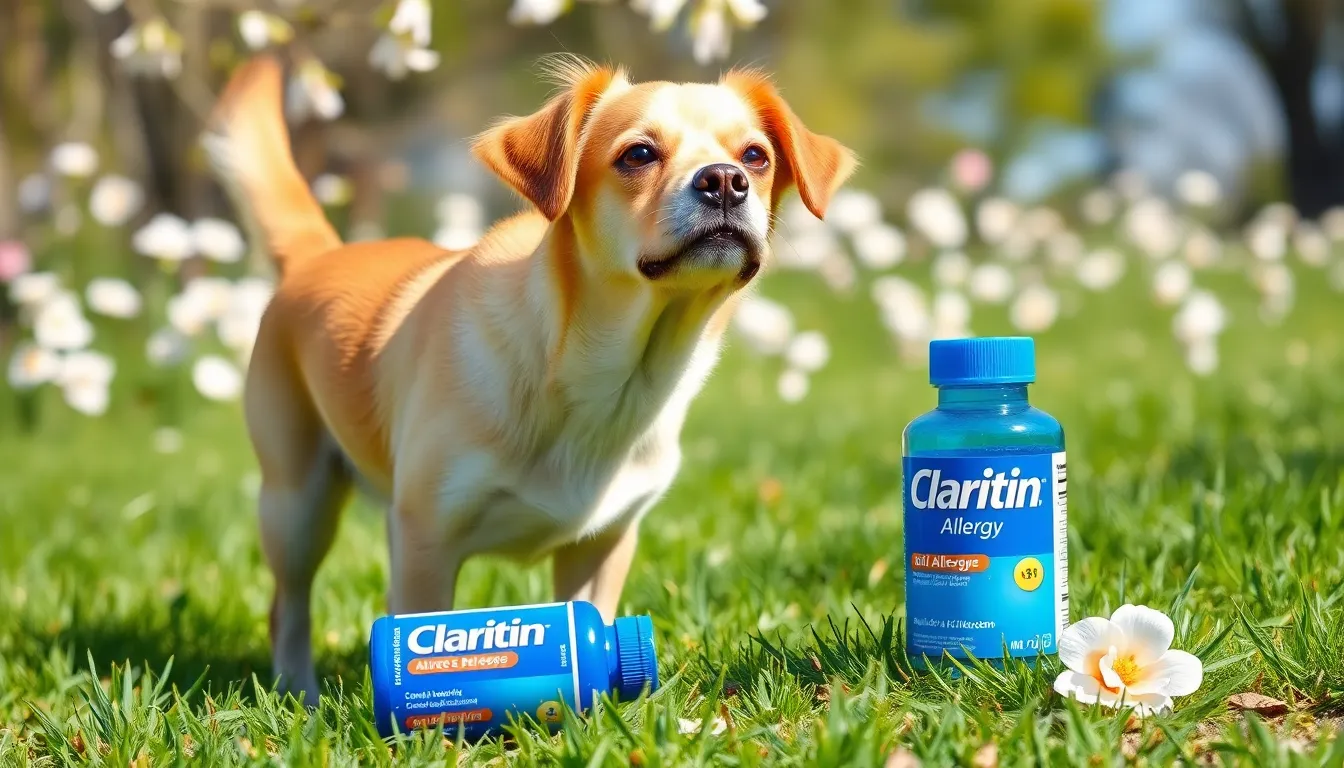When your furry friend starts sneezing like it’s allergy season, you might wonder if human meds can save the day. Can you give dogs Claritin? It’s a question that’s probably crossed many pet owners’ minds, especially when faced with a dog that looks like it’s auditioning for a role in a sneezy comedy.
While Claritin is a go-to for humans battling pollen and dust, the canine world has its own set of rules. Just because it works for you doesn’t mean it’s a one-size-fits-all solution for your pup. So before you rush to share your allergy relief, let’s dig into the facts and find out if this over-the-counter hero is a safe sidekick for your four-legged buddy.
Table of Contents
ToggleUnderstanding Claritin
Claritin, known by its generic name loratadine, serves as an antihistamine to alleviate allergy symptoms in humans. It effectively counters sneezing, runny nose, and itchy eyes, making it a popular choice for treating seasonal allergies.
What Is Claritin?
Claritin functions as a non-drowsy antihistamine. It blocks histamines, which are chemicals that trigger allergic reactions. People often rely on Claritin for relief from various allergens like pollen and pet dander. While this medication works selectively in humans, its effects on dogs may differ significantly.
Active Ingredients
Loratadine acts as the primary active ingredient in Claritin. Inactive ingredients may include lactose, corn starch, and magnesium stearate, which are generally safe for humans. While these components assist in enhancing effectiveness, they don’t guarantee similar safety and efficacy in dogs. Pet owners should consult with a veterinarian before administering Claritin to their pets.
Can You Give Dogs Claritin?

Pet owners often question the safety of giving Claritin to dogs. Understanding the specifics can help in making an informed decision.
Recommended Dosage for Dogs
Appropriate dosing of Claritin for dogs typically depends on the dog’s weight. Vets often recommend a dose of 0.1 to 0.2 mg per kilogram of body weight. For example, a 10-kilogram dog may receive a dosage of 1 to 2 mg. This usually translates to half of a standard 5 mg tablet. However, doses can vary based on the dog’s overall health and specific allergy symptoms. It’s crucial for pet owners to consult a veterinarian before administering any medication.
Potential Benefits
Claritin may provide several benefits for dogs suffering from allergies. This antihistamine can effectively relieve symptoms like itching, sneezing, and nasal discharge. Owners often notice improved comfort for dogs sensitive to allergens such as pollen or dust. Additionally, using a non-drowsy formula like Claritin allows dogs to remain active and alert during allergy season. These advantages make Claritin a potential option for managing canine allergies, but veterinary guidance remains essential.
Risks and Side Effects
Administering Claritin to dogs carries specific risks and potential side effects that pet owners must recognize. Understanding these concerns helps ensure the safety and well-being of pets.
Common Side Effects in Dogs
Dogs may experience side effects when taking Claritin, including lethargy, gastrointestinal upset, and dry mouth. Lethargy manifests as a noticeable decrease in energy or reluctance to engage in normal activities. Gastrointestinal upset may lead to vomiting or diarrhea, which can be distressing for both the pet and owner. Dry mouth, although less common, may result in increased thirst or difficulty swallowing. Observing a dog after administering Claritin is crucial. If side effects occur, immediate veterinary consultation is recommended.
Who Should Avoid Claritin?
Certain dogs should avoid Claritin entirely. Breeds with pre-existing health conditions, such as liver or kidney issues, face higher risks when taking this medication. Pregnant or nursing dogs should also steer clear of Claritin due to potential effects on the offspring. Dogs already taking other medications that interact with loratadine must not receive Claritin without prior veterinary approval. Ensuring the pet’s health history is shared with a veterinarian facilitates safe medication choices. Always prioritize health when considering allergy relief options.
Alternatives to Claritin for Dogs
When it comes to alleviating allergy symptoms in dogs, several alternatives to Claritin exist. These options may provide safe and effective relief without the potential risks associated with human medications.
Other Allergy Medications
Benadryl, or diphenhydramine, serves as a common alternative antihistamine for dogs, successfully treating allergic reactions and motion sickness. The typical dosage is 1 mg per pound of body weight, administered every 8 hours, but consultation with a vet is necessary to confirm proper dosing. Apoquel stands out as a prescription medication specifically designed for dogs. This solution addresses itching caused by allergies by targeting inflammatory processes. Another option is Zyrtec, or cetirizine, known for its effectiveness in treating allergies in pets. Dosages usually range from 0.5 to 1 mg per kilogram of the dog’s weight, making it another suitable choice with veterinary advice.
Natural Remedies
Natural remedies present another avenue for managing dog allergies. One effective method involves using omega-3 fatty acids, which support skin health and reduce inflammation. Fish oil supplements, rich in omega-3s, contribute to alleviating allergy symptoms. Additionally, including apple cider vinegar in a dog’s diet may improve skin condition and relieve itching. Diluting it with water creates a safe topical treatment for irritated skin. Furthermore, herbal options like chamomile or calendula offer anti-inflammatory and soothing properties. These natural alternatives help maintain a dog’s overall wellness while addressing allergy issues.
Administering Claritin to dogs can provide relief from allergy symptoms but should always be approached with caution. Each dog is unique and may respond differently to medications designed for humans. Consulting a veterinarian is essential to ensure safety and effectiveness.
Pet owners must be aware of potential side effects and the importance of proper dosage based on their dog’s weight. Alternatives such as Benadryl, Apoquel, or natural remedies might also offer effective solutions for managing allergies. Prioritizing a dog’s health and well-being is crucial in making informed decisions about treatment options.








